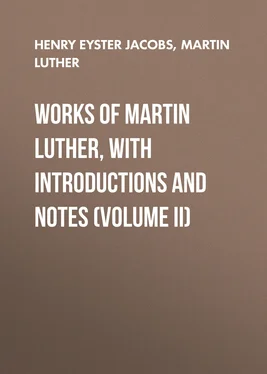Henry Eyster Jacobs - Works of Martin Luther, with Introductions and Notes (Volume II)
Здесь есть возможность читать онлайн «Henry Eyster Jacobs - Works of Martin Luther, with Introductions and Notes (Volume II)» — ознакомительный отрывок электронной книги совершенно бесплатно, а после прочтения отрывка купить полную версию. В некоторых случаях можно слушать аудио, скачать через торрент в формате fb2 и присутствует краткое содержание. Жанр: foreign_prose, foreign_religion, Философия, foreign_psychology, foreign_antique, на немецком языке. Описание произведения, (предисловие) а так же отзывы посетителей доступны на портале библиотеки ЛибКат.
- Название:Works of Martin Luther, with Introductions and Notes (Volume II)
- Автор:
- Жанр:
- Год:неизвестен
- ISBN:нет данных
- Рейтинг книги:3 / 5. Голосов: 1
-
Избранное:Добавить в избранное
- Отзывы:
-
Ваша оценка:
- 60
- 1
- 2
- 3
- 4
- 5
Works of Martin Luther, with Introductions and Notes (Volume II): краткое содержание, описание и аннотация
Предлагаем к чтению аннотацию, описание, краткое содержание или предисловие (зависит от того, что написал сам автор книги «Works of Martin Luther, with Introductions and Notes (Volume II)»). Если вы не нашли необходимую информацию о книге — напишите в комментариях, мы постараемся отыскать её.
Works of Martin Luther, with Introductions and Notes (Volume II) — читать онлайн ознакомительный отрывок
Ниже представлен текст книги, разбитый по страницам. Система сохранения места последней прочитанной страницы, позволяет с удобством читать онлайн бесплатно книгу «Works of Martin Luther, with Introductions and Notes (Volume II)», без необходимости каждый раз заново искать на чём Вы остановились. Поставьте закладку, и сможете в любой момент перейти на страницу, на которой закончили чтение.
Интервал:
Закладка:
[Sidenote: Diminution of the Papal Household]
7 . The Roman See should also do away with the officia 227 227 See above, p. 99.
, and diminish the swarm of vermin at Rome, so that the pope's household can be supported by the pope's own purse. The pope should not allow his court to surpass in pomp and extravagance the courts of all kings, seeing that such a condition not only has never been serviceable to the cause of Christian faith, but the courtiers have been kept thereby from study and prayer, until they are scarce able to speak about the faith at all. This they proved quite plainly at the last Roman Council 228 228 The Fifth Lateran Council (1512-17).
, in which, amongst many other childish and frivolous things, they decreed that the soul of man is immortal and that every priest must say his prayers once a month on pain of losing his benefice. How shall matters which concern faith and the Church be decided by people so hardened and blinded by great avarice, wealth and worldly splendor, that they have only now decreed that the soul is immortal? It is no small shame to all Christians that at Rome they deal so disgracefully with the faith. If they had less wealth and pomp, they could pray and study better, and so become worthy and able to deal with matters of faith, as was the case in olden times when they were bishops, and did not presume to be kings over all kings.
[Sidenote: Bishops' Oaths]
8 . The hard and terrible oaths should be abolished, which the bishops are wrongfully compelled to render to the pope 229 229 See above, p. 90, note 1.
, and by which they are bound like servants, as that worthless and unlearned chapter, Significasti 230 230 In the canon law, Decretal. Greg. lib. i, tit. 6, cap. 4 . The decretal forbids the bestowing of the pallium (see above, p. 89, note 3) on an archbishop elect, until he shall first have sworn allegiance to the Holy See.
, arbitrarily and most stupidly decrees. It is not enough that they burden us in body, soul and property with their many mad laws, by which faith is weakened and Christendom ruined; but they seize upon the person and office and work of the bishops, and now upon the investiture 231 231 The induction of Church officials into office. The term was used particularly of the greater offices—those of bishop and abbot. These offices carried with them the enjoyment of certain incomes, and the possession of certain temporal powers. For this reason the right of investiture was a bone of contention between popes and emperors during the Middle Ages.
also, which was in olden times the right of the German emperors, and in France and other kingdoms still belongs to the kings. On this point they had great wars and disputes with the emperors 232 232 Especially in the time of the Emperors Henry IV and V (1056-1125).
until at last, with impudent authority, they took the right and have kept it until now; just as though the Germans, above all the Christians on earth, had to be the puppets of the pope and the Roman See and do and suffer what no one else will do and suffer. Since, then, this is sheer violence and robbery, hindering the regular authority of the bishops and injuring poor souls, therefore the emperor and his nobles are in duty bound to prevent and punish such tyranny.
[Sidenote: Pope and Emperor]
9 . The pope should have no authority over the emperor, except that he anoints and crowns him at the altar, just as a bishop anoints and crowns a king 233 233 The German Empire was regarded during the Middle Ages as a continuation of the Roman Empire. (See below, p. 153.) The right to crown an emperor was held to be the prerogative of the pope; until the pope bestowed the imperial crown, the emperor bore the title, "King of the Romans."
; and we should not henceforth yield to that devilish pride which compels the emperor to kiss the pope's feet or sit at his feet, or, as they claim, hold his stirrup or the bridle of his mule when he mounts for a ride; still less should he do homage and swear faithful allegiance to the pope, as the popes have shamelessly ventured to demand as if they possessed that right. The chapter Solite 234 234 In the canon law, Decretal. Greg. lib. i, tit. 33, cap. 6.
, in which the papal authority is raised above the imperial authority, is not worth a heller, nor are any of those who rest upon it or fear it; for it does nothing else than force the holy words of God out of their true meaning, and wrest them to human dreams, as I have showed in a Latin treatise 235 235 In the treatise, Resolutio Lutheriana super propositione XIII, de potestate papae (1520). Weimar Ed. , II, pp. 217 ff.; Erl. Ed., op. var. arg. , Ill, pp. 293 ff.
.
Such extravagant, over-presumptuous, and more than wicked doings of the pope have been devised by the devil, in order that under their cover he may in time bring in Antichrist, and raise the pope above God, as many are already doing and have done. It is not proper for the pope to exalt himself above the temporal authorities, save only in spiritual offices such as preaching and absolving. In other things he is to be subject, as Paul and Peter teach, in Romans xiii [Rom. 13:1], and I Peter iii [1 Pet. 2:13 f.], and as I have said above.
He is not vicar of Christ in heaven, but of Christ as He walked on earth [Phil. 2:7] 236 236 cf. The Papacy at Rome , Vol. I, pp. 357 f.
. For Christ in heaven, in the form of a ruler, needs no vicar, but He sits and sees, does, and knows all things, and has all power. But He needs a vicar in the form of a servant, in which He walked on earth, toiling, preaching, suffering and dying. Now they turn it around, take from Christ the heavenly form of ruler and give it to the pope, leaving the form of a servant to perish utterly. He might almost be the "Counter-christ" whom the Scriptures call Antichrist, for all his nature, work and doings are against Christ, for the destruction of Christ's nature and work.
It is also ridiculous and childish that the pope, with such perverted and deluded reasoning, boasts in his decretal Pastoralis 237 237 A decree of Pope Clement V of 1313, incorporated subsequently in the canon law, Clement, lib. ii, tit. 11, cap. 2.
, that he is rightful heir to the Empire, in case of a vacancy. Who has given him this right? Did Christ, when He said, "The princes of the Gentiles are lords, but ye shall not be so" [Luke 22:25 f.]? Did St. Peter will it to him? It vexes me that we must read and learn such shameless, gross, crazy lies in the canon law, and must even hold them for Christian doctrine, when they are devilish lies. Of the same sort is also that unheard-of lie about the "Donation of Constantine." 238 238 A forged document of the VIII Century, professing to come from the hand of the Emperor Constantine (306-337). The Donation conveyed to the pope title to the city of Rome (the capital had been removed to Constantinople), certain lands in Italy and "the islands of the sea." It was used by the popes of the Middle Ages to support their claims to worldly power, and its genuineness was not disputed. In 1440, however, Laurentius Valla, an Italian humanist, published a work in which he proved that the Donation was a forgery. This work was republished in Germany by Ulrich von Hutten in 1517, and seems to have come to Luther's attention in the early part of 1520, just before the composition of the present treatise (C. Enders II, 332). Luther subsequently (1537) issued an annotated translation of the text of the Donation ( Erl. Ed. , XXV, pp. 176 ff.).
It must have been some special plague of God that so many people of understanding have let themselves be talked into accepting such lies as these, which are so manifest and clumsy that I should think any drunken peasant could lie more adroitly and skilfully. How can a man rule an empire and at the same time continue to preach, pray, study and care for the poor? Yet these are the duties which properly and peculiarly belong to the pope, and they were imposed by Christ in such earnest that He even forbade His disciples to take with them cloak or money [Matt. 10:10], since these duties can scarcely be performed by one who has to rule even a single household. Yet the pope would rule an empire and continue to be pope! This is a device of the knaves who would like, under the pope's name, to be lords of the world, and by means of the pope and the name of Christ, to restore the Roman Empire to its former state.
Интервал:
Закладка:
Похожие книги на «Works of Martin Luther, with Introductions and Notes (Volume II)»
Представляем Вашему вниманию похожие книги на «Works of Martin Luther, with Introductions and Notes (Volume II)» списком для выбора. Мы отобрали схожую по названию и смыслу литературу в надежде предоставить читателям больше вариантов отыскать новые, интересные, ещё непрочитанные произведения.
Обсуждение, отзывы о книге «Works of Martin Luther, with Introductions and Notes (Volume II)» и просто собственные мнения читателей. Оставьте ваши комментарии, напишите, что Вы думаете о произведении, его смысле или главных героях. Укажите что конкретно понравилось, а что нет, и почему Вы так считаете.












